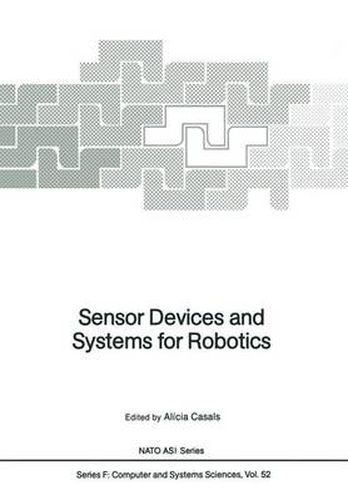Readings Newsletter
Become a Readings Member to make your shopping experience even easier.
Sign in or sign up for free!
You’re not far away from qualifying for FREE standard shipping within Australia
You’ve qualified for FREE standard shipping within Australia
The cart is loading…






This title is printed to order. This book may have been self-published. If so, we cannot guarantee the quality of the content. In the main most books will have gone through the editing process however some may not. We therefore suggest that you be aware of this before ordering this book. If in doubt check either the author or publisher’s details as we are unable to accept any returns unless they are faulty. Please contact us if you have any questions.
As robots improve in efficiency and intelligence, there is a growing need to develop more efficient, accurate and powerful sensors in accordance with the tasks to be robotized. This has led to a great increase in the study and development of different kinds of sensor devices and perception systems over the last ten years. Applications that differ from the industrial ones are often more demanding in sensorics since the environment is not usually so well structured. Spatial and agricultural applications are examples of situations where the environment is unknown or variable. Therefore, the work to be done by a robot cannot be strictly programmed and there must be an interactive communication with the environment. It cannot be denied that evolution and development in robotics are closely related to the advances made in sensorics. The first vision and force sensors utilizing discrete components resulted in a very low resolution and poor accuracy. However, progress in VLSI, imaging devices and other technologies have led to the development of more efficient sensor and perception systems which are able to supply the necessary data to robots.
$9.00 standard shipping within Australia
FREE standard shipping within Australia for orders over $100.00
Express & International shipping calculated at checkout
This title is printed to order. This book may have been self-published. If so, we cannot guarantee the quality of the content. In the main most books will have gone through the editing process however some may not. We therefore suggest that you be aware of this before ordering this book. If in doubt check either the author or publisher’s details as we are unable to accept any returns unless they are faulty. Please contact us if you have any questions.
As robots improve in efficiency and intelligence, there is a growing need to develop more efficient, accurate and powerful sensors in accordance with the tasks to be robotized. This has led to a great increase in the study and development of different kinds of sensor devices and perception systems over the last ten years. Applications that differ from the industrial ones are often more demanding in sensorics since the environment is not usually so well structured. Spatial and agricultural applications are examples of situations where the environment is unknown or variable. Therefore, the work to be done by a robot cannot be strictly programmed and there must be an interactive communication with the environment. It cannot be denied that evolution and development in robotics are closely related to the advances made in sensorics. The first vision and force sensors utilizing discrete components resulted in a very low resolution and poor accuracy. However, progress in VLSI, imaging devices and other technologies have led to the development of more efficient sensor and perception systems which are able to supply the necessary data to robots.